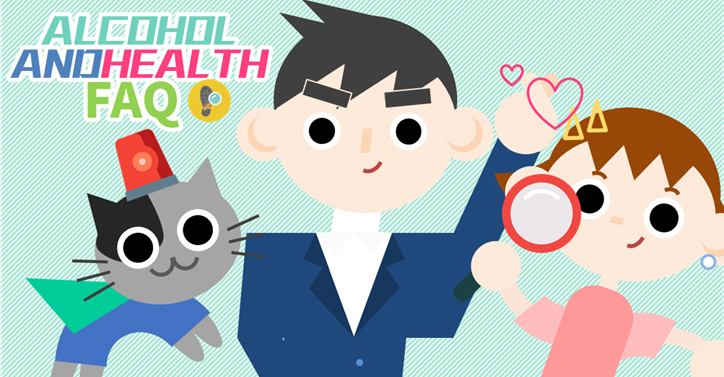Is drinking good for my health?


![]() Rumor has it that red wine is good for the heart. Is it true?
Rumor has it that red wine is good for the heart. Is it true?

Some studies show that wine, particularly red wine, may protect the heart more than beer or liquor at equivalent levels of consumption, but this is still controversial. On the other hand, some evidence reveals that people who drink wine over other alcoholic beverages tend to live healthier lives. For example, drinkers who prefer wine tend to smoke less, drink less, exercise more and have a healthier diet compared with those who prefer beer or liquor. So, these other factors or even other hidden causes, rather than red wine, may account for the better health outcomes. Click for more information on “Is red wine good for heart”.
![]() Is having red face after drinking a sign of good health?
Is having red face after drinking a sign of good health?

After drinking, alcohol enters the blood through absorption in the stomach and small intestine. In general, ethanol will be broken down into acetaldehyde by an enzyme called alcohol dehydrogenase (ADH) in the liver, and acetaldehyde is then further converted into harmless chemicals by another enzyme called acetaldehyde dehydrogenase. People who get a red face when drinking alcohol is primarily due to an inherited lack of acetaldehyde dehydrogenase, leading to acetaldehyde getting accumulated in the body. This accumulation of acetaldehyde leads to the dilation of capillaries, especially in the face, neck and shoulder area, leading to a flushed look. It can hardly be considered a sign of good health.
![]() Will alcohol make me feel warmer?
Will alcohol make me feel warmer?

It is not true that alcohol is a good means to keep warm. Although one feels warm immediately after drinking alcohol, it actually accelerates the loss of body heat through dilated blood vessels in the skin, resulting in chilling instead. Because of this, drinking too much alcohol in very cold weather can cause hypothermia.
![]() Will drinking alcohol quench thirst and clear the heat?
Will drinking alcohol quench thirst and clear the heat?

No. On the contrary, drinking alcohol will make you feel more thirsty and increase your risk of getting heat stroke during hot weather. This is because alcohol promotes elimination of water via the kidneys as urine.
![]() Does alcohol help sleep problem?
Does alcohol help sleep problem?

Despite the fact that alcohol is a central nervous system depressant and makes people drowsy, drinking alcohol at bedtime is not a smart idea. Alcohol encourages urination, which results in more trips to the toilet at night. A study has also shown that alcohol causes more frequent nighttime awakenings and fatigue the next day. Most importantly, using alcohol as a sleep aid can be a sign of problem drinking. To help sleep problems, try a cup of hot milk instead of drinking alcohol. For more information on “How alcohol may affect your mental health”, please click here.
![]() Can alcohol help with weight loss?
Can alcohol help with weight loss?

4kcal/g. A 330ml can of regular beer of 5% alcohol by volume contains about 13 grams of alcohol. Only taking alcohol (the major calorie content) into account, assuming a person drinks 2 cans of beer every day for 3 months, the amount of energy gained from alcohol intake will be approximately 16500kcal, which is equivalent to about 5lbs of fat tissue. For more information on alcohol’s energy content, click here.
![]() Can alcohol help with my stress?
Can alcohol help with my stress?
No. Binge drinking can contribute to feelings of depression and anxiety in the long run, and make stress harder to deal with. This is because regular, heavy drinking interferes with chemicals in the brain that are necessary for good mental health and functioning. There are other more effective ways to cope with stress than drinking, such as exercise, a hot bath or even some gentle stretches to relieve tension in your body. You can also talk to a trusted friend to come up with some solutions. For more information on “How alcohol can affect your mental health”, please click here. For more tips on how to keep a good mood, please visit the “Joyful@HKThis link will open in a new window” website.
![]() Can alcohol improve my performance in sport?
Can alcohol improve my performance in sport?
Physical activity has a lot of health benefits, but alcohol is likely to offset these benefits and, even worse, cause harmful effects to the body. In general, pre-exercise drinking can result in low blood sugar, dehydration, poor balance and incoordination, and in turn can affect athletic performance or cause accidents. Drinking after exercise may affect the body to restore its function at a slower pace. In addition, drinking increases the risk of obesity. For more information on “Sport and Alcohol”, please click here.










































